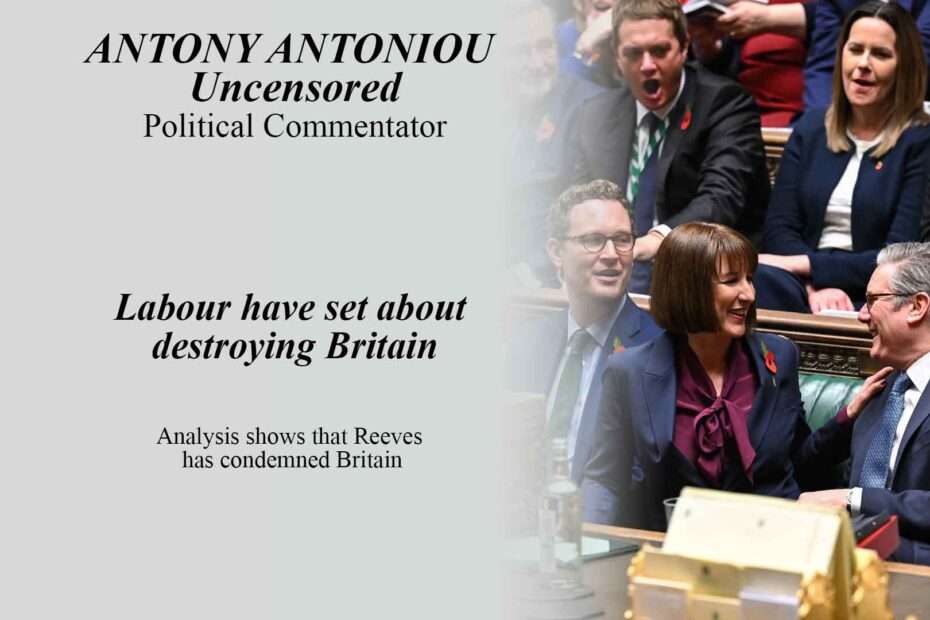Labour have set about destroying Britain
Britain’s Economic Transformation: A Critical Analysis of Recent Policy Shifts
The United Kingdom stands at a significant economic crossroads, with recent policy changes marking a substantial departure from previous fiscal approaches. The latest Budget presentation by Shadow Chancellor Rachel Reeves represents what many observers consider a fundamental shift in British economic policy-making.
The New Economic Framework
The Budget introduces sweeping changes to Britain’s fiscal landscape, particularly regarding taxation and public spending. At its core, the proposals signal a marked deviation from the economic model that has characterised British policy for roughly four decades—a model that positioned Britain as a bridge between American and European economic approaches.
Taxation Changes
The proposed fiscal measures include several significant adjustments to the tax framework:
– An expansion of inheritance tax provisions
– Modifications to capital gains tax
– Adjustments to employers’ national insurance contributions
– Changes to various taxation thresholds
These alterations are projected to increase the tax burden from 36.4 per cent of GDP to 38.2 per cent by 2029-30, positioning Britain above the G7 average. This represents a notable shift from the 1990s, when the tax burden hovered around 28 per cent of GDP.
Public Spending Trajectory
Public expenditure is set to follow an upward trajectory:
– Current spending levels of 44.9 per cent of GDP
– An initial increase to 45.3 per cent
– A projected settling at 44.5 per cent by 2029-30
This spending pattern marks a 4.9 percentage point increase from pre-pandemic levels, reflecting a significant expansion of state involvement in the economy.
Historical Context and Future Implications
The current policy direction represents a departure from both the Thatcherite approach of the 1980s and the Third Way policies of the Blair-Brown era. The new framework appears to embrace:
– Enhanced state intervention in economic planning
– Increased public sector investment
– A more comprehensive approach to public services funding
The Office for Budget Responsibility’s analysis suggests various pressures on departmental budgets, though the precise nature of these constraints remains subject to debate amongst economic observers.
Economic Philosophy Shift
The new approach reflects a philosophical repositioning of economic policy, moving away from:
– The free-market, free-trading entrepot model
– The previous balance between private enterprise and state involvement
– The historically lower taxation levels that characterised previous decades
Looking Forward
The implications of these policy shifts are likely to be far-reaching. Key considerations include:
Short-term Impact
– Immediate effects on public sector spending
– Near-term adjustments to taxation levels
– Initial responses from various economic sectors
Medium-term Considerations
– Evolution of public service delivery
– Adaptations in private sector behaviour
– Changes in investment patterns
Long-term Prospects
– Structural changes to the economy
– Shifts in Britain’s competitive position
– Evolution of the public-private sector relationship
Comparative Context
When viewed against international benchmarks, Britain’s new economic direction places it closer to European models of higher taxation and public spending than to the American approach. This represents a significant shift from the position Britain has occupied in recent decades.
Technical Analysis
The fiscal mathematics underlying these changes warrant careful examination:
– Tax revenue projections and their underlying assumptions
– Spending commitments and their sustainability
– Impact on various economic sectors and demographics
– Long-term implications for public finances
Economic Implications
The broader economic implications of these policy shifts deserve consideration across several dimensions:
Business Impact
– Effects on small and medium enterprises
– Implications for international investment
– Changes to business planning horizons
Individual Impact
– Changes to personal taxation
– Effects on savings and investment
– Implications for retirement planning
Sectoral Impact
– Public sector adjustments
– Private sector responses
– Third sector considerations
Concluding Observations
These policy changes represent a significant reorientation of British economic policy. While their full implications will only become clear over time, they mark a notable departure from previous approaches to managing the economy.
The success or failure of these measures will likely be determined by:
– Their impact on economic growth
– Effects on public service delivery
– International competitiveness
– Social outcomes
– Fiscal sustainability
As Britain navigates this new economic direction, careful monitoring of outcomes and willingness to adjust policies as needed will be crucial for ensuring positive economic and social results.
Summary
Here’s a concise bullet-point summary of the key points:
• Major Policy Shift
– UK’s economic policy is undergoing significant transformation
– Marks departure from 40-year economic model that balanced US and European approaches
– New direction favours increased state intervention
• Key Tax Changes
– Tax burden to rise from 36.4% to 38.2% of GDP by 2029-30
– Will exceed G7 average
– Includes changes to:
* Inheritance tax
* Capital gains tax
* National insurance contributions
* Various tax thresholds
• Public Spending
– Set to increase from 44.9% to 45.3% of GDP
– Projects to settle at 44.5% by 2029-30
– 4.9 percentage points higher than pre-pandemic levels
• Historical Context
– Departs from Thatcherite free-market approach
– Differs from Blair-Brown era policies
– Tax burden in 1990s was around 28% (currently much higher)
• Economic Philosophy
– Moves away from free-market, free-trading model
– Embraces greater state intervention
– Focuses on public sector investment
– Emphasises expanded public services
• Main Implications
– Will affect business planning and investment
– Changes personal taxation landscape
– Impacts public service delivery
– Influences UK’s international competitiveness
• Future Considerations
– Success depends on:
* Economic growth outcomes
* Public service effectiveness
* International competitiveness
* Fiscal sustainability
– Will require ongoing monitoring and potential adjustments

